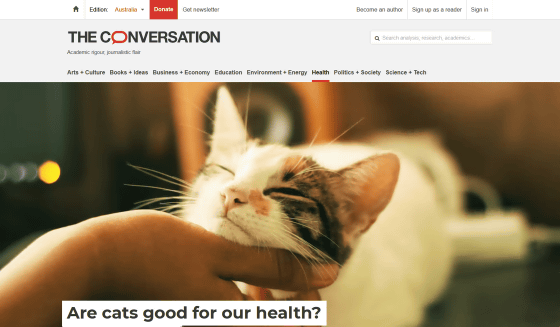What are the benefits and drawbacks that cats have to the human mind and body?

Cats have been loved by humans as pets for thousands of years, and many people feel happy every day thanks to having a cute cat. However, living with a cat is not completely risk-free, explains
Are cats good for our health?
https://theconversation.com/are-cats-good-for-our-health-238993

What do owners think of their cats?
Several studies have shown that many cat owners consider their cats to be part of the family. A survey of 1,800 cat owners in the Netherlands reported that half of the owners considered their cats to be 'family members,' and one in three considered their cats to be 'children' or 'best friends.' An American study measuring 'family ties' also found that cats are considered to be as much a part of the family as dogs.
On the other hand, while it is often said that 'cats don't care about their owners,' in reality cats are very attached to their owners , preferring human interaction over food and toys, and being able to distinguish their owner's words from other human words .
◆ Developing a sense of purpose
Owning a cat or other pet has been linked to less social isolation , and some people say it gives them more enjoyment and a sense of purpose , but Hazel points out that the benefits may vary depending on how the cat interacts with its owner.
In one study , people were categorized into 'open relationships,' 'remote relationships,' 'casual relationships,' 'codependent,' and 'friendship' based on the distance and interaction between them. The results showed that owners who had a codependent or friendly relationship with their cats had a higher emotional connection to their cats.

Relationship with heart health
Several
Owning a cat has also been associated with positive changes in the gut microbiome, especially in women , which may translate into health benefits such as improved blood sugar levels and reduced inflammation.
◆Improvement of mental health
Owning a cat has also been linked to improved psychological well-being , and people with depression have been shown to experience improvements in their symptoms through gentle contact with a cat.
In addition, a survey of veterans conducted by Hazel and his team found that people who had a strong attachment to pets had lower mental health scores. However, one veteran said, 'My cat helps me get up in the morning,' while another said, 'My cat helps me relax when I'm dealing with anxiety or depression, or when I wake up in the middle of the night from frequent nightmares.' This suggests that people with poorer mental health may be more attached to cats.

◆ Negative impact on mental health
Owning a cat comes with responsibility, and it is true that the burden on owners increases when their cat's health deteriorates.
Toxoplasmosis
A well-known zoonotic disease carried by cats is toxoplasmosis , caused by a parasite called Toxoplasma that lives in cats. Toxoplasmosis causes mild flu-like symptoms, and if pregnant women become infected, they may suffer from miscarriage or stillbirth, or may cause problems such as blindness and seizures in their newborns.
Pregnant women and people with weakened immune systems are at highest risk of toxoplasmosis, and if these people have cats, Hazel recommends that they be careful not to empty the cat litter tray and wear gloves when handling it if necessary. Changing the cat litter tray every day can eliminate toxoplasmosis before it can become infectious to humans. Toxoplasmosis is most likely to occur in stray cats that eat wild animals, and the risk of infection from pet cats that do not go outside and do not eat raw meat is not that high.

◆Cat allergy
Approximately one in five people have cat allergies, but the number is on the rise. When cats lick their fur, allergens accumulate in their saliva, and cat hair and dander can fall onto the floor, causing an allergic reaction.
However, if you don't have severe allergies, you can still live with a cat as long as you wash your hands regularly, keep your home clean, vacuum frequently to remove dander, and take other precautions to keep your cat out of places where you want to completely eliminate allergens, such as your bedroom.
While cats can trigger allergies, there is also evidence that exposure to cats may play a protective role in preventing the development of asthma and allergies, because exposure to allergens changes the immune system, making it less likely to have an allergic reaction, Hazel said.

Related Posts:







